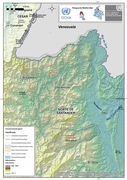
Map of the Catatumbo Region in Norte de Santander. The Humanitarian Refugee can be found in the municipality of Teorama.
Catatumbo is located on a forgotten corner of Colombian territory. Dirt roads, which are only passable by all-terrain vehicles, reach rural communities that lack a minimum of social investment. The peasant population in the area has lived in the midst of the armed conflict and thousands of persons have been forcibly displaced. In order to survive, the peasant population considers its only opportunity is growing coca crops. This year, the Colombian government has continued with the fumigation and eradication of illicit crops. According to Margarita Silva, secretary of the government of Norte de Santander, this policy has created a humanitarian crisis in the region1.
«The fumigations cause skin illnesses, rashes and colds for adults and children», explains Elías Naom Quintero, health coordinator for the Humanitarian Refuge in Catatumbo and member of the Catatumbo Peasant Farmer Association (ASCAMCAT)2. «Not only coca is fumigated, but also all subsistence crops like cassava, plantain and corn. Fumigations have destroyed everything. So, what can this poor man do? He has abandoned his land since there is no social investment»3.
Since 29 April 2009, along with hundreds of peasant families in the region, ASCAMCAT established the Humanitarian Refuge in the rural community of Caño Tomás (municipality of Teorama) in the northern part of Catatumbo, near the border between Colombia and Venezuela. The purpose was to set up a peace territory to draw attention to the situation in the area, the lack of social investment and alternatives to coca crops, human rights violations committed by legal and illegal armed actors, and the possibility of coal exploitation by multinational companies4.
«We live without dignity», says Naom. «As opposed to what everyone believes, we don’t earn a lot from growing coca. One only makes enough to survive. We don’t have beds, chairs, bathrooms, toilets or electricity. There are no health centres. Education is mediocre in the existing few schools. We do not want our children to have to grow coca because the State has not given them any alternatives».
Commitments from the State
After some unsuccessful attempts, a space for dialogue was achieved with government authorities through three roundtables, which have included the participation of national and international organisations, the mass media, the Human Rights Ombudsman’s Office, and human rights representatives from the Vice-President’s Office and the government of Norte de Santander.
In response to the demands made by the peasants, these State institutions have committed to the establishment of public hearings and a departmental table to guarantee the rights of human rights defenders and members of these organisations; advice on plans for assistance and protection against violations to human rights and international humanitarian law (IHL); the creation of a development plan for Catatumbo in which ASCAMCAT will participate; and a package of humanitarian financial aid for 500 families5.
While waiting for the Colombian State to fulfil its commitments, the people from the communities making up the Humanitarian Refuge remain in a highly vulnerable situation They are in the midst of an armed conflict in an area with mine fields and often impassable roads. Despite the warnings at the perimeter of the camp prohibiting the entrance of armed actors, the guerrilla and the national army have not heeded this demand6. Due to these harassments, the Ombudsman’s Office has requested protection measures for the population7.
Although the conditions in the camp are difficult, the alternative is even worse: abandoning their land to live in urban poverty. «If we go to the city,» concludes Naom «it would be to beg, live under a bridge and perhaps be killed. Since there are no alternatives, we have to protest here»..
::
1 Up to the end of November, 500 hectares planted with coca has reportedly been fumigated in Catatumbo, but the police expect to spray 5,000 hectares of illicit crops. «Piden parar la fumigación a los cultivos ilícitos en Catatumbo.» El Tiempo, 18 April 2009
2 Interview at the Humanitarian Refuge with Elías Naom Quintero on 6 June 2009. ASCAMCAT is one of the organisations accompanied by the Luís Carlos Pérez Lawyers’ Collective (CCALCP). Due to this accompaniment, PBI has been to the Humanitarian Refuge on three different occasions.
3 Ibid. 2
4 «¡Las comunidades del Catatumbo Bajo nos declaramos en campamento refugio humanitario!» Prensa Rural, 14 May 2009
5 «Importantes compromisos de las autoridades con los campesinos del Catatumbo», Prensa Rural, 5 October 2009
6 «Denuncian hostigamientos del Ejército sobre refugio humanitario», El Tiempo, 23 July 2009; «Ejército Viola Nuevamente el Refugio Humanitario», International Peace Observatory, 6 October 2009; «Guerrilleros irrespetan el territorio del campamento refugio humanitario.» Prensa Rural, 28 May 2009
7 «Defensor del Pueblo solicita medidas eficaces de protección para población vulnerable en N. de Santander», Human Rights Ombudsman’s Office, 31 July 2009
